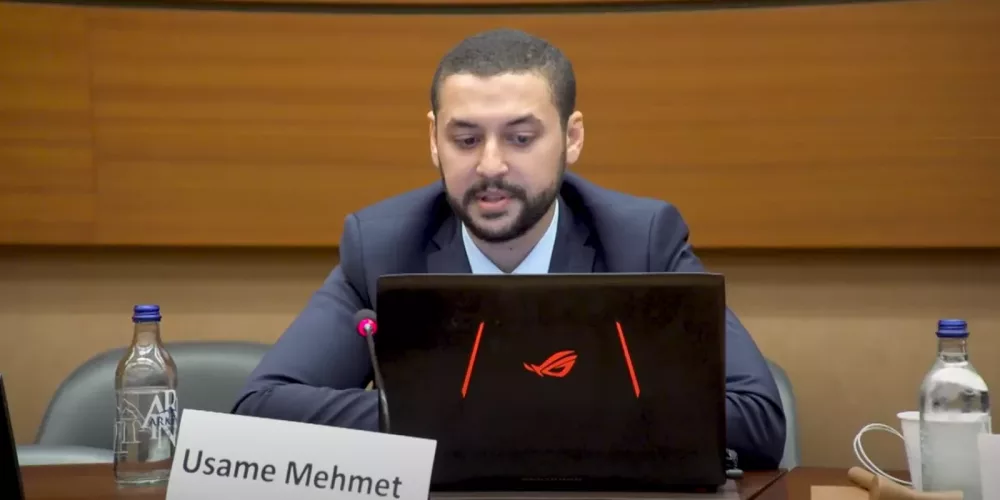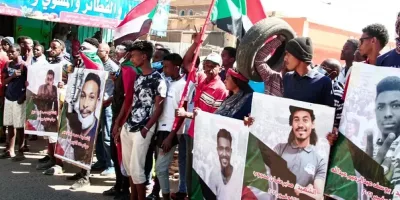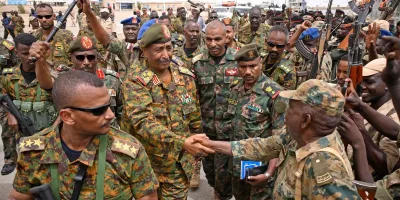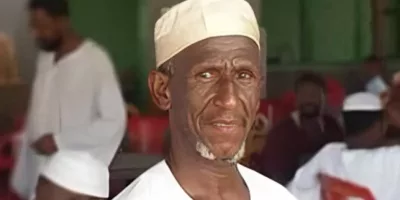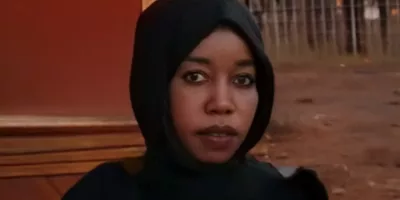Press Report
The Committee for Justice (CFJ) participated in a side event on the sidelines of the 57th session of the UN Human Rights Council, organized by “Nazra for Feminist Studies,” on September 19, 2024, titled “Violence Against Women and Girls in the Middle East and North Africa.”
– The need for activists to have a “safe bubble” to work without fear:
Usame Mehmetoglu, Regional and UN Communications Officer for CFJ, said in his intervention that there must be a focus on the situation of human rights defenders in Sudan, especially the critical challenges they face, particularly since April 2023.
Oglu pointed out that CFJ has documented numerous cases of defenders who have been harassed, intimidated, arrested, and even killed. These violations, he stated, are not coincidental but part of a systematic campaign aimed at silencing their voices.
Oglu highlighted some cases of Sudanese human rights defenders who suffered gross violations, including Salah Al-Tayeb, a lawyer who was arrested on April 17, 2024, by military intelligence of the Sudanese army. During his detention, he was tortured for 19 days and died from his injuries on May 5, 2024. This case illustrates the brutality of the situation.
Another case involved journalist Muawiya Abdulrazek, who was killed on June 5, 2024, when Rapid Support Forces militia stormed his home in southern Khartoum and brutally murdered him for documenting violations. This underscores the risks associated with journalism in a violent environment.
Additionally, lawyer Hanan Hassan was prevented from renewing her passport due to her name being listed on an unofficial list issued by the Public Prosecutor’s Office, illustrating that threats are not just limited to direct violence but also include legal barriers.
Oglu noted that these cases reflect a systematic targeting of human rights defenders, adding that this type of repression is no longer seen as isolated incidents but rather points to a deterioration of human rights in the country.
He added that “one of the most urgent needs is the creation of a ‘safe bubble’ where human rights defenders can work without fear. They are not just victims; they are the heroes of the struggle for justice, documenting and monitoring violations, supporting victims and their families, and playing a crucial role in any future transitional justice process.”
In conclusion, Oglu called for an immediate halt to the targeting of defenders and emphasized the need to extend the mandate of the fact-finding mission by at least one year to give it the time necessary to perform its vital work, allowing defenders to provide comprehensive and reliable information.
– Our alliance with CFJ to enhance gender accountability:
Egyptian feminist activist and founder of “Nazra for Feminist Studies,” Mozn Hassan, emphasized in her intervention that “when we talk about solidarity with women and feminist movements in Sudan after the war, we realize that our support must be genuine and constructive. Sudanese women have faced immense challenges and have always been a source of inspiration in our struggle for political rights. Our goal is to work together to amplify Sudan’s voice on the international agenda.”
Mozn explained that her organization, “Nazra,” has formed an alliance with CFJ and Sudanese women and youth groups to promote gender accountability. She added, “it is important to understand that this accountability is not only about women but includes all members of society, and we need to understand people’s differences and empower ourselves as part of this struggle.”
Mozn noted that when considering the experiences of women in Libya, it is clear that the absence of a civil structure did not prevent them from documenting sexual violence, and they worked hard to include these issues in the mandate of the International Criminal Court. Similarly, the efforts of Yemeni women to document violence for peace and to rebuild their country are also an inspiration.
She added that “it is important to remember that including women in decision-making processes is not merely a choice but a necessity. Women must have a seat at the table, not only those who support our rights but also those who may disagree with us. These discussions require real diversity, and we must be critical of how advisory councils for women in international organizations are formed.”
Mozn also pointed out that “when we talk about Syrian women, we see how, despite the challenges, they have been able to build a strong feminist movement across generations, and we must learn from their experiences and cooperate with the new generation of women in Sudan.”
In her closing remarks, Mozn called for support for working mothers striving for a better life for their children in complex environments, highlighting the importance of addressing sexual violence in Sudan, where it has been used as a tool of repression. She also emphasized the importance of including women in all discussions related to their rights and security as a key step toward achieving justice and equality.
– hopes turned into nightmares:
In the same vein, Lina Mahjoub, former Sudanese Minister of Labor and Social Development and a board member of the Women’s Center for Rights and Freedoms, spoke in her intervention about Sudanese women and their iconic role in the struggle for their rights and changing the regime in Sudan, focusing on the challenges the movement faced, especially after the 2019 Sudanese revolution.
Mahjoub noted that there were great hopes after the fall of the 30-year authoritarian regime, but what followed was a nightmare, especially for women who face unprecedented violence.
She added that “when discussing the transitional phase, we felt that the international community let us down, especially after the coup. Sudanese people came out in large numbers to support democracy despite the challenges, but there was insufficient intention for coexistence between civil and military forces, leading to increased violence and the return of the same players responsible for the Darfur tragedies.”
Mahjoub stressed that after the revolution, women’s participation in the transitional government was enhanced, but despite leading the protests, they were unable to gain sufficient representation in decision-making processes. Despite important legal reforms, such as the criminalization of female genital mutilation, the biggest challenge has always been enhancing women’s participation in peace efforts.
She emphasized the need to break the cycle of impunity and ensure accountability for perpetrators of crimes, particularly gender-based crimes, and the importance of documenting crimes and providing adequate support for human rights defenders. She called for intensified international efforts to protect human rights and ensure accountability.
In her closing remarks, Mahjoub called for more solidarity and international support, with a focus on protecting activists, human rights, and providing necessary humanitarian assistance to affected populations.
Such events are important opportunities to highlight the region’s conflicts, especially the ongoing conflict in Sudan, and to express solidarity with Sudanese citizens in their efforts toward peace. They also serve to support human rights defenders and advocate for their safety and protection as they carry out their vital role in safeguarding basic human rights and documenting violations.

